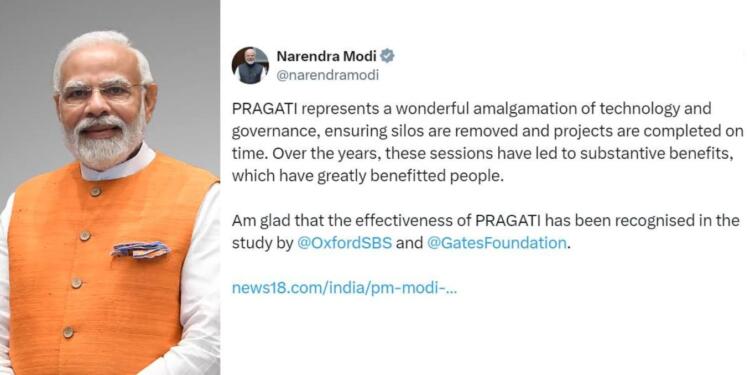Recently, the University of Oxford mentioned how glad the Prime Minister Narendra Modi was over the acknowledgement of PRAGATI in its research work. The PRAGATI platform, launched by Prime Minister Modi in 2015, stands for Pro-Active Governance and Timely Implementation. According to a study by the University of Oxford titled “From Gridlock to Growth: How Leadership Enables India’s PRAGATI Ecosystem to Power Progress,” PRAGATI has significantly contributed to the transformation of infrastructure project delivery in India by reducing implementation delays. The platform is now a vital tool for overseeing the nation’s extensive social sector and infrastructure initiatives.
The Prime Minister shared his joy on social media, saying, “Am glad that the effectiveness of PRAGATI has been recognized in the study by @OxfordSBS and @GatesFoundation.” Modi further added, “PRAGATI represents a wonderful amalgamation of technology and governance, ensuring silos are removed and projects are completed on time. Over the years, these sessions have led to substantive benefits, which have greatly benefited people.”
PRAGATI represents a wonderful amalgamation of technology and governance, ensuring silos are removed and projects are completed on time. Over the years, these sessions have led to substantive benefits, which have greatly benefitted people.
Am glad that the effectiveness of…
— Narendra Modi (@narendramodi) December 2, 2024
The Oxford report states that PRAGATI is a commitment to assisting India in overcoming bureaucratic inertia and developing an efficient and accountable mindset while demonstrating a “Team India” mentality. It has succeeded in uniting various stakeholders under the federal and state governments on a common platform, which is promoting collaboration and progress on intricate infrastructure development projects, such as interministerial coordination and land acquisition.
PRAGATI speeds up project timelines using cutting-edge technologies, including the use of real-time data, drone feeds, and video conferencing. The government has also ensured that all benefits of development reach every nook and corner of this country. This has also been a very significant contributor to improving the efficiency and effectiveness of governance, particularly while developing infrastructure.
The Reserve Bank of India and the National Institute of Public Finance and Policy have conducted studies showing that every rupee invested in infrastructure generates 2.5 to 3.5 rupees in GDP. That makes this a crucial source of economic growth and also demonstrates how well-planned infrastructure development should spur the economy.
Lessons from PRAGATI are highly relevant to countries around the world that are struggling with the Middle-Income Trap, according to the Oxford report’s conclusion. This goes on to illustrate the approach with strategic investments in infrastructure in partnership with innovative governance practices so that conditions could be provided and long-term economic growth and social uplift could take place. The study further opined that it goes about with this kind of positive example India has created using its examples regarding the acceptance of digital tools with facilitate interaction among governments at all tiers.


























